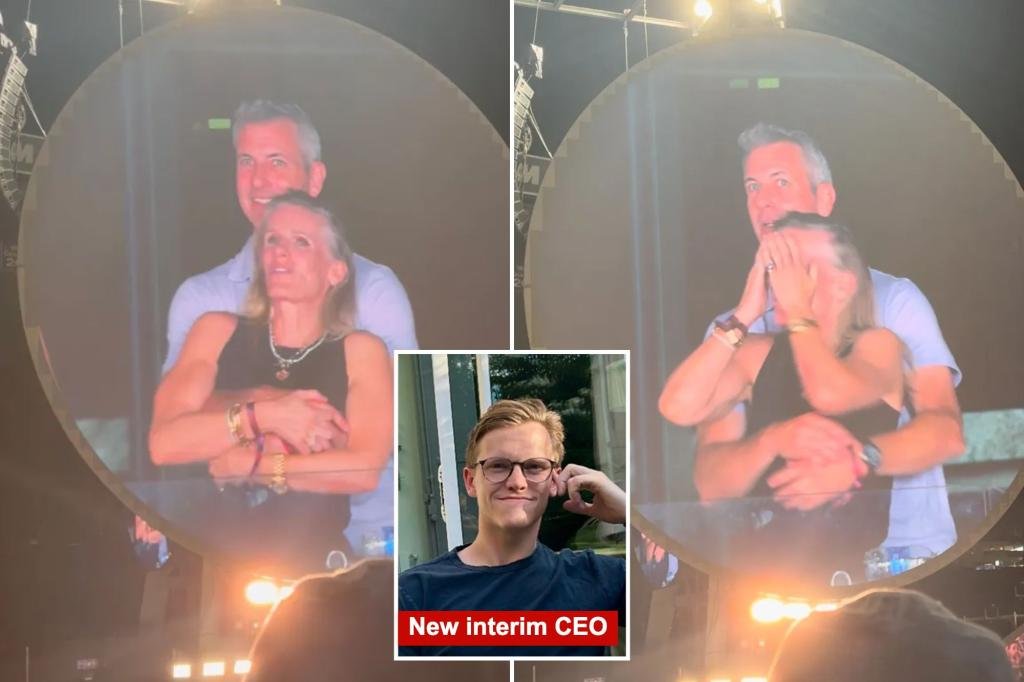Business
Andy Byron, caught canoodling with his head of HR Kristin Cabot at Coldplay concert, has resigned from AI company Astronomer

Andy Byron has resigned from his big bucks CEO position at AI company Astronomer just days after he was caught canoodling with his head of HR on a jumbotron at a Coldplay concert, setting off a wild internet frenzy.
“As stated previously, Astronomer is committed to the values and culture that have guided us since our founding. Our leaders are expected to set the standard in both conduct and accountability, and recently, that standard was not met,” the company said in a statement Saturday.
“Andy Byron has tendered his resignation, and the Board of Directors has accepted.”
Byron was placed on leave Thursday and an interim CEO was named.
Byron and Kristin Cabot sparked a near-unprecedented viral storm when they were seen desperately dodging the kiss cam while cuddling at the concert near Boston Wednesday night.
Lead singer Chris Martin, thinking he had caught a tender moment, seemed confused before remarking “Either they’re having an affair or they’re very shy.”
By Thursday morning, the pair were identified as the high powered CEO and his lead HR person.
Astronomer will start searching for its next chief executive while Pete DeJoy continues to serve as interim CEO, the company said.
“Before this week, we were known as a pioneer in the DataOps space, helping data teams power everything from modern analytics to production AI,” their Saturday statement said.
“While awareness of our company may have changed overnight, our product and our work for our customers have not.”
Here is the latest on the CEO caught cheating on a Coldplay concert jumbotron
Byron’s wife, Megan Kerrigan, removed their shared last name from her Facebook profile before deleting it altogether after being inundated with messages about the alleged affair.
Cabot, the now-on-leave HR exec, is also married, and shares two young children with Privateer Rum owner Andrew Cabot.
A man who answered the door at the home of Kerrigan’s mother angrily declined to comment Saturday, but one neighbor who knew the family praised them.
“The Kerrigans are salt of the earth, hardworking people and they don’t deserve to be dragged through the mud,” the neighbor told The Post.
Andy Byron, Megan Kerrigan, Kristin Cabot and her apparent husband Andy could not be reached for comment.
Business
How Ancestry Decides Which AI to Use to Synthesize Its Data Trove

There’s a fierce battle underway in Silicon Valley, and there’s one piece of technology at the center of it all: AI.
When OpenAI released its AI-powered chatbot, ChatGPT, in 2022, it introduced large language models to the broader public and was embraced by business leaders. It also cast a glaring spotlight on its competitors, some of whom raced to release their own AI-powered chatbots.
The growing number of LLMs poses a tricky question for companies determining which model to use.
Sriram Thiagarajan, Ancestry’s chief technology officer and executive vice president of product and technology, told Business Insider that the company is taking a more-the-merrier approach.
“We are agnostic to LLM models,” Thiagarajan said. “We use multiple AI models. Be it Azure, OpenAI, Meta’s Lama, or offerings under Amazon Bedrock.”
For Ancestry, a Utah-based genealogy company that sells DNA test kits, the AI model’s brand is less important than the end result.
“We built an abstraction layer — what we call an AI gateway — on top that helps us leverage whatever models better fit our case,” he said. “We have built our own agentic framework in a way that helps us provide that unique family story and personalized experience for our consumers.”
Ancestry and AI
Thiagarajan said Ancestry had just begun diving into AI and machine learning when he joined the company in 2017.
At that time, Ancestry was trying to find an efficient way to digitize content, which is a massive undertaking for the company. Ancestry collects numerous forms of records, including birth, death, military, land, immigration, census, and newspapers.
“We’ve collected over 65 billion records across 80-plus countries,” Thiagarajan said. “Just to give a scale, that’s about 10,000 terabytes of data on our platform that we use to provide discoveries to our users.”
In the past, processing and identifying troves of records took months.
“About 15 or 20 years ago, when we digitized the 1940 census, it took us about nine months to do it in a manual way at 10 times the cost,” Thiagarajan said.
Then, the company embraced AI.
“We said, ‘Why don’t we apply computer vision AI techniques to automatically digitize content without manual intervention?’ Thiagarajan said. “Fast forward to the 2021 timeframe, we used our own proprietary handwriting recognition computer vision technologies, and we compressed the time to market to under nine days from nine months at a fraction of the cost.”
Still, Sriram said the company relies on humans to fact-check the AI answers “as needed.”
“We’ve built some automated controls and systems that certainly reduce the amount of time we need to spend checking,” he said. “We want to be extra careful in making sure that what we produce using AI is grounded in truth. Grounded in facts.”
These days, Ancestry is going all in on the tech — especially with its employees.
“There are a lot of things we do to drive AI education within the company,” he said. “Be it brown bag lunches, internal forums, or providing an environment where people across departments can experiment.”
Hackathons are also regular events at Ancestry and provide a space for collaboration across teams.
“So encouraging innovation as part of the flow of work, as they call it, as opposed to that residing as a silo,” Thiagarajan said.
Business
Immigration law firm making £1.7m in legal aid loses contract over standards | Immigration and asylum

An immigration law firm that signed up thousands of asylum seekers and generated income of £1.7m in legal aid in the last year, despite only employing five solicitors to represent them, has had its government contract terminated after concerns about its performance, the Guardian has learned.
The decision leaves many asylum seekers struggling to find new legal representatives at a time when the government is increasing the number of cases it refuses.
In the year ending June 2025 initial asylum grants fell from 58% to 48%, leaving more people having to lodge appeals, something that is difficult to do without a legal representative.
Middlesex Law Chambers’ legal aid income for immigration work dramatically increased from £43,000 in 2021 to £1.7m in 2025. The firm is listed on the Solicitors Regulation Authority website as having 15 offices around the country, many in legal aid deserts such as Peterborough, Plymouth and Crawley.
When the Guardian phoned these offices there was either no reply or a receptionist for the office block where the firm rented a space said it was no longer there.
The director of Middlesex Law Chambers, criminal defence solicitor Sheraz Chowdhry, said the firm had planned to expand into those areas but in most cases had not done so and had now terminated rental arrangements for those office spaces.
It currently has one solicitor employed at its Southall office doing private immigration work, one solicitor at an office in Canary Wharf in east London doing family work and a small team at its Uxbridge office doing criminal defence work. Legal aid contracts continue for those areas of work.
Chowdhry joined the firm at the end of last year just months before the previous lawyer in charge of immigration work, Hina Choudhery, died from complications of cancer.
He said: “Ultimately the firm, obstructed by Hina’s poor health over the last two years or so, has found it difficult to maintain its once very high standards in the immigration department.”
He added he found out about the termination of the legal aid contract for immigration work just weeks ago. “The decision was also only communicated to us via email on 20 August 2025.”
When asked to explain why the firm had expanded its caseload so dramatically and how it was possible to provide adequate legal representation for thousands of asylum seekers with just five immigration solicitors and a mix of 15 junior and more senior caseworkers, he said: “No solicitor was here during the expansion phase. It is difficult for me to explain how the firm suddenly grew so large in such a short space of time. I do not know.”
A typical caseload for a legally aided asylum solicitor or caseworker is 15–20. With the number of staff employed by the firm during its period of rapid expansion each solicitor and caseworker would have had about 164 cases.
Frances Timberlake, of Migrants Organise, which has many migrant members who complained about the service provided by the firm, said: “It is the Ministry of Justice’s duty to ensure that legal advice is available to people who need it. But decades of funding cuts and neglect to the legal aid system have left many people in our communities without any support.
after newsletter promotion
“We urgently need funding for good legal advice and for the government to stop pushing migrants into hostile, expensive legal processes just as a charade for Reform,” she said.
Dr Jo Wilding, a researcher and senior lecturer in legal aid at the University of Sussex and an immigration barrister, said: ‘This was completely foreseeable when one small firm with very few accredited staff set up offices in several new areas, including six serious advice desert areas, and started taking on hundreds of cases.
“It should have been obvious that vulnerable people were being exploited but the Legal Aid Agency doesn’t seem to have identified or recognised that there was a problem. The solution to this is to stop treating legal aid for the most vulnerable people as if it was a market, and to pay that money to a reputable expert law firm or not-for-profit to do the work.”
Rami, a former client of Middlesex Law Chambers, said: “It’s good that the government has stepped in and closed this firm. But it feels too late, because a lot of people like me have already suffered because of the work of this firm. I had to do my asylum interview without any real advice beforehand, holding my evidence in my hand that I had translated on Google because the law firm had not done it. I have lost a lot of time in my life because of this. I have grey hair now when before this I did not.
“People seeking asylum face a lot of problems and a lawyer can help us to get through bad situations. But it is very difficult to find a legal aid lawyer and many people don’t speak English so cannot know which is a good law firm and which is not.”
A Legal Aid Agency spokesperson said: “Middlesex Law Chambers’ immigration legal aid contract has been terminated.
“Firms that hold legal aid contracts are subject to annual reviews. These can lead to financial sanctions or, as in this case, contract termination where standards are not met.”
Business
Uefa backs off overseas league fixtures but the struggle for power still goes on | Uefa

Never underestimate the attraction of a good can-kick. That would appear to be the message coming out of Tirana on Thursday when Uefa announced it had not taken the epochal decision on overseas league fixtures that the world of football had anticipated. Instead, the executive committee decided it would embark on a round of consultation, one that would even take in the considerations of supporters to boot.
This is likely a sensible decision. There has been a fair amount of surprise in some quarters that the question of whether and by how much football leagues should be allowed to move from domestic to international is only now being properly debated in the corridors of power. After all, the first writ in this debate was served by the promoter Relevent against the United States Soccer Federation in 2019. Only with the prospect of La Liga staging a fixture between Barcelona and Villarreal in Miami as soon as December has the issue come into focus. But to have discussion at all will be regarded by many as better late than never. It is also a break with the current way of doing things.
Fifa’s Club World Cup, the biggest and most disruptive new development in the game for some time, is largely viewed as having come about as the result of one man’s determination to drive change (that man being Gianni Infantino). The process Fifa undertook to establish the tournament has, however, led to legal action and no small amount of rancour over a claimed lack of consultation with competition organisers. (It should be noted there has been less complaint from clubs, some of whom pocketed tens of millions of dollars for taking part.) In this instance, by contrast, Uefa appears to have opted for jaw jaw rather than war war.
The president of Uefa, Aleksander Ceferin, flagged this possible direction in an interview conducted before the Champions League draw in Monaco last month. Asked about the plan for overseas fixtures by Politico, Ceferin said: “We’re not happy but, as much as we checked legally, we don’t have much space here, if the federation agrees, and both federations agreed. But I think that for the future we’ll have to discuss this very seriously, because … fans should watch football at home … We will open this discussion also with Fifa, and with all the federations, because I don’t think it’s a good thing.”
If Uefa’s presumably well-remunerated lawyers weren’t wildly wrong in their calculations then deferral with a chance of dialogue was perhaps the best option Uefa could plump for in the short term. It may best serve its interests in the longer term too. With the contest to control the future of the world’s most popular sport continuing to heat up, it is possible to argue that Uefa is among the most vulnerable to any shift away from the current model of the men’s game. Its tournaments – the European Championship, the Nations League, even the Champions League – are likely to be the first to feel the squeeze should the international calendar take on even more matches in the medium term via changes such as a biennial Club World Cup. Faced with this position, being an organisation that is seen to be listening, and perhaps even collaborative, may well be a good idea.
In the Politico interview Ceferin drew a red line against a biennial Club World Cup, saying: “I wouldn’t agree with that, but I don’t think [Fifa] want to.” That last line goes against much of the reporting on the topic but was of a piece with a more emollient tone as Ceferin rolled back on remarks Uefa had made months before condemning Infantino’s “private political interests” after the Fifa’s president arrived late for his own Congress after touring the Gulf with Donald Trump. Ceferin told Politico the language used had been “a bit overemotional” and that relations with Fifa were “absolutely” in a better place.
Again with the conciliation, again another possible sign of where the balance of power lies. But by behaving constructively, by acting less as a rival and more as a facilitator, Uefa will find itself in tune with another player which could yet weigh in on the future of European football (and by extension the game as a whole): Brussels. The European courts are where much of the battles is being played out, with no ruling more consequential than that involving the European Super League, which questioned the ability of sports governing bodies to act as both regulator and competition organiser without the risk of “abusing” their “dominant position”. The European Commission, meanwhile, is taking more and more interest in ensuring the concept of a “European Sports Model” where open competition (ie promotion and relegation) runs alongside financial solidarity from the top to the bottom of the pyramid.
The European commissioner for intergenerational fairness, youth, culture and sport, Glenn Micallef, made the unusual decision to intervene in the debate over international fixtures last week, describing the plans as betraying supporters and putting the European Sports Model at risk. On Thursday, he spoke again, commending Uefa’s decision to pause and discuss. “This is the right and responsible way to do things; through inclusive dialogue and consultation,” he wrote on social media.
The Commission is the body that initiates Europe’s political direction and if it felt it necessary to intervene to protect the European Sports Model, it could. Such an action would likely throw the existing power structures in football up in the air and being on the right side of any such shift would be to any governing body’s advantage. If Ceferin’s remarks on the issue of international fixtures are correct, it may be we see such matches yet. But while it is unfortunate to lose some battles, sometimes they may help you in fighting a war.
-

 Business2 weeks ago
Business2 weeks agoThe Guardian view on Trump and the Fed: independence is no substitute for accountability | Editorial
-
Tools & Platforms1 month ago
Building Trust in Military AI Starts with Opening the Black Box – War on the Rocks
-

 Ethics & Policy2 months ago
Ethics & Policy2 months agoSDAIA Supports Saudi Arabia’s Leadership in Shaping Global AI Ethics, Policy, and Research – وكالة الأنباء السعودية
-

 Events & Conferences4 months ago
Events & Conferences4 months agoJourney to 1000 models: Scaling Instagram’s recommendation system
-

 Jobs & Careers3 months ago
Jobs & Careers3 months agoMumbai-based Perplexity Alternative Has 60k+ Users Without Funding
-

 Podcasts & Talks2 months ago
Podcasts & Talks2 months agoHappy 4th of July! 🎆 Made with Veo 3 in Gemini
-

 Education2 months ago
Education2 months agoVEX Robotics launches AI-powered classroom robotics system
-

 Education2 months ago
Education2 months agoMacron says UK and France have duty to tackle illegal migration ‘with humanity, solidarity and firmness’ – UK politics live | Politics
-

 Podcasts & Talks2 months ago
Podcasts & Talks2 months agoOpenAI 🤝 @teamganassi
-

 Funding & Business3 months ago
Funding & Business3 months agoKayak and Expedia race to build AI travel agents that turn social posts into itineraries





















